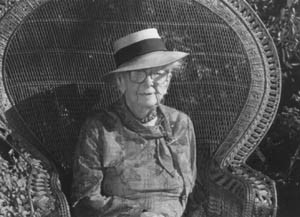Marjory Stoneman Douglas
Author

1890 - 1998
Inducted in 1993
Biography
The name "Marjory Stoneman Douglas" will resonate forever as one of the most important voices to emerge from the dawning of environmental consciousness in 20th Century America. A lifelong crusader for conservation and women's rights through her writing and speaking, Douglas will always be remembered as "the woman who saved the Everglades." This is largely thanks to her environmental classic, The Everglades: River of Grass published in 1947, and her subsequent grassroots campaign to bring a halt to land-use practices that threatened the region.
Douglas was born in Minneapolis, Minnesota in 1890 but after her parent's divorce (when she was 6), moved to her mother's home in Taunton, Massachusetts. As a youth, Douglas became a voracious reader and began to write. At 17, she was awarded a prize for a story published by the Boston Herald. In 1912, Douglas graduated from Wellesley College with a bachelor's degree in English. During her college days, she became active in the women's suffrage movement.
In 1914, Douglas married a man 30 years her senior who turned out to be a con artist. Divorce soon followed, and Douglas accepted her father's invitation to come to Miami and join the editorial staff of a newspaper he published (that eventually became The Miami Herald). She began in 1915 as a society columnist, work she found largely uninteresting. She soon jumped at an opportunity to escape to another life.
She first joined the U.S. Naval Reserve, but soon found that she was ill-suited for the military life. Granted a discharge, she signed up for the American Red Cross and was in Paris when the armistice ending World War I was signed. She soon returned to Miami and her father's paper, this time as an assistant editor and columnist.
Her column, "The Galley," became a pulpit for her views on women's rights, civil rights, urban planning and most anything else that interested her. The column became widely popular, and by the time she quit the newspaper in 1923 she had become something of a local celebrity.
For the next 60-odd years, Douglas supported herself through her writings. She became a prolific freelancer, churning out over 100 articles, mostly fiction. Forty of her stories ran in the Saturday Evening Post, and many had environmental themes with settings and characters drawn from her frequent visits to the Everglades.
By 1940, Douglas' attention was focused on the Everglades. She spent five years researching what little science existed about the vast, buggy tract of wilderness, and soon understood its profound importance in the ecology of South Florida. When River of Grass was published in 1947, the book sold out its first printing in a month. The book galvanized public interest in protecting the Everglades against development and made a lasting impact on the future of Florida's conservation and land-use policies.
But a burgeoning population in South Florida would soon threaten to undo whatever progress had been made to protect the Everglades from the encroachment of developers. Throughout the 1950s, ‘60s and much of the ‘70s, the Everglades suffered enormous damage from drainage projects and large agricultural enterprises. At the age of 79, Douglas founded the Friends of the Everglades, a grassroots membership organization that helped stop the construction of a proposed jetport to be built in the Everglades' pristine Big Cypress region.
By 1980, Douglas' tireless advocacy for saving the Everglades had earned her the everlasting admiration and respect of conservationists around the world. In 1993, President Bill Clinton awarded her the Presidential Medal of Freedom, the highest honor the government can give to a citizen.
Douglas lived to be 108, most of those years spent living with her cats in her Tudor-styled cottage she built in 1924 in Coconut Grove. Her ashes were scattered over the 1.3-million-acre Marjory Stoneman Douglas Wilderness Area in the Everglades National Park. Douglas' house and property is owned by the State of Florida and since 2007 has been maintained by the Florida Park Service as a lasting memorial to a remarkable "woman who saved the Everglades."
Related Links
- National Women's Hall of Fame
- Friends of the Everglades - http://www.everglades.org/
- Marjory Stoneman Douglas: Visionary of the Everglades

